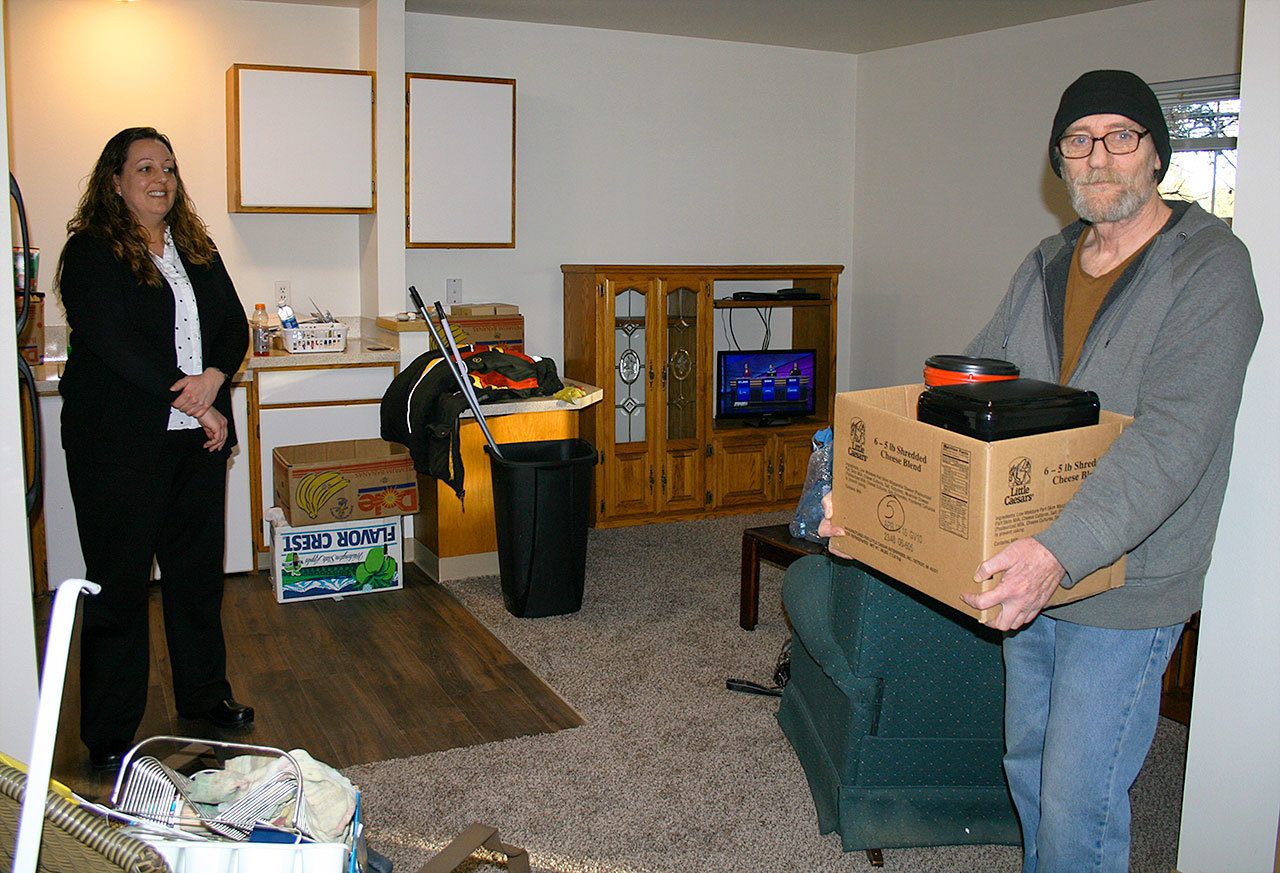Oak Harbor resident Roy Morrison’s name finally came up.
Morrison had been on a Section 8 affordable housing waiting list since 2012 but finally moved into a subsidized apartment this week.
With help from Sunrise Services, an agency providing mental health and recovery services in Island County, Morrison is a Section 8 success story.
The path to getting there, though, was replete with obstacles and setbacks. He and advocates agree that the process is too long, cumbersome and restrictive, especially for people who may be elderly or disabled.
MORRISON WAS living in his car when he first put his name on the Section 8 list and began looking for transitional housing as he sought a more permanent place.
To even get on the Section 8 waiting list, he first had to learn which apartments on Whidbey offered rental assistance through the federally funded program.
Then he needed to put his name on the waiting lists for each complex, said Julia Williams, his case manager at Sunrise Services.
With the help from Sunrise, Morrison found the transitional housing he was looking for, and he was able to move out of his car.
But the wait for a permanent home grew into months, and the months into years.
SIMPLY STAYING on the list proved to be more than half the battle, Williams said.
“You have to call in and do a check-in once a month or once every two months, depending on the apartment complex, to keep your name on that list,” she said. “It’s kind of like a lottery, because some people — if they don’t call and check in — their name comes off the list, and you get moved up, right? So you never really know where you’re at on that list.”
As the costs of transitional housing mounted, Morrison looked for something more affordable. He found a 500-square-foot studio in Oak Harbor.
But it wasn’t as simple as signing a lease. He didn’t have enough money for a deposit. Fortunately, the nonprofit Opportunity Council provided him with deposit assistance, Williams said.
Still, Morrison paid about 90 percent of his income for rent and utilities, compared to the 30 percent he’d pay for Section 8 housing.
WHEN MORRISON’S name came up on the list for Section 8 housing in December, he only had a week or two to decide if he would take the opportunity or let his name return to the bottom of the list. He accepted the assistance, but that opened the door to a new series of obstacles.
To get out of the studio, he had to break his lease.
At first, Morrison feared he would have to continue paying for his studio. Under the terms, he could be on the hook for $150 to $175, plus the monthly rent, until the lease expired or until someone else moved in.
On Jan. 27, the property management company found a renter to replace Morrison.
“Now that Roy is moving into a new apartment, low income, he still has to do a deposit,” Williams said. “So Opportunity Council was like ‘OK, well hopefully you will get your deposit back from the place you’re in now, right?’”
But there remained the fee for breaking the lease.
The property manager did let Morrison set up a payment plan to cover the termination fee.
WILLIAMS contacted the Housing Authority of Island County, which told her this kind of situation isn’t uncommon.
“When people come up on this federal low-income assistance list and have no idea when their name’s gonna come up, there should be some sort of clause in these lease agreements that allows them out of (a lease) without being penalized,” Williams said.
“So now the Opportunity Council is paying for the deposit at Oak Bay Station.”
At Oak Bay Station — Morrison’s Section-8 subsidized apartment — initial rent is based on residents’ overall need, relative to each other, Williams said.
Under that policy, Morris-on would need to pay first month’s rent in full, no subsidy, and future rent would be at the subsidized rate, about 30 percent of his income.
Williams said she has a great working relationship with Oak Bay Station Apartments, especially now that the organization waived the first full-month’s rent.
Morrison’s subsidized rent moving forward is $166 per month.
MORRISON, WHO changes a neighbor’s oxygen tank and helps friends who need rides to the grocery store, remains upbeat and hopeful, giving all credit to Williams for getting him into affordable housing.
“If she wasn’t here, I wouldn’t be anywhere near stable,” Morrison said. “I wouldn’t probably have a home.”
“I would be in my car, ‘cause she has talked me out of it several times. She’s a blessing.”
“I will have money to function and money to live on now,” he said.
“I will be a lot happier.”



